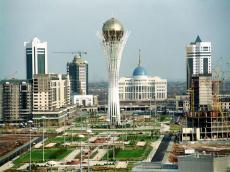|
|
TODAY.AZ / World news
Astana welcomes agreements on de-escalation zones in Syria
11 July 2017 [17:38] - TODAY.AZ

By Azernews
By Kamila Aliyeva
Kazakhstan has welcomed the recent arrangements regarding de-escalation zones in the southwest of Syria.
The Kazakh Foreign Ministry announced about it in a statement following the results of the agreement on the de-escalation zones for southwest Syria reached between Russia and the United States, Kazinform reported.
Astana, the capital city of Kazakhstan, hosted five rounds of Syrian talks since January 2017, which have resulted in a memorandum of understanding on creation of de-escalation zones in Syria.
Russia, Turkey and Iran, are sponsoring the negotiations in Astana. The talks have become known as the Astana Process and are meant to create conditions for the success in the more comprehensive peace talks in Geneva on the overall political settlement of the Syrian conflict.
The ceasefire regime in the provinces of Deraa, Suweida and Quneitra that came into effect on July 9 is just another practical step towards a comprehensive cessation of hostilities all over Syrian territory, according to the Kazakh Foreign Ministry.
“We call on all forces standing for the soonest resolution of the Syrian conflict, including the Syrian Government and the armed opposition, to be fully committed to the ceasefire regime,” the statement reads.
Kazakhstan expressed its full support for the Geneva peace talks on Syria under the auspices of the United Nations and voiced hope on reaching the specific solutions within the political process for settlement of the Syrian crisis.
The civil war in Syria between government and opposition with various terrorist groups involved, including Daesh (also known as ISIS or ISIL), began back in March 2011.
Syrian President Bashar Assad managed to turn the tide of war in his favor after Russia started an air campaign in September 2015, while Iran is an uncompromising supporter of the Syrian leader.
Thanks to the ceasefire agreement signed in December 2016 as well as the high-level talks in Astana and Geneva, the level of violence in Syria has significantly decreased since early 2017 compared to the previous years.
URL: http://www.today.az/news/regions/163079.html
 Print version
Print version
Connect with us. Get latest news and updates.
See Also
- 23 June 2025 [23:00]
Phineas and Ferb creators reveal why the show still resonates with fans - 23 June 2025 [22:30]
Tesla Corporation launches Robo taxi service - 23 June 2025 [22:00]
Europe sees alarming spike in harmful ozone levels amid early heatwave - 23 June 2025 [21:30]
Xiaomi Set to Reveal Pricing for New YU7 SUV at June 26 Launch Event - 23 June 2025 [21:00]
France voices concern over US-Iran escalation - 23 June 2025 [19:30]
Damascus church attack death toll rises to 25 - 23 June 2025 [19:03]
Spain calls for suspension of EU-Israel trade deal - 23 June 2025 [09:00]
South Korea Trade Minister heads to Washington for tariff talks - 23 June 2025 [08:00]
British man arrested in Cyprus on suspicion of espionage and terror offences - 22 June 2025 [23:20]
Three dead and dozens injured in stadium incident following MC Alger’s Title win
Most Popular
 Macron kicked out of Niger
Macron kicked out of Niger
 Apple wants to develop new processors using AI
Apple wants to develop new processors using AI
 EBRD highlights Azerbaijan’s strong potential in developing low-carbon hydrogen sector
EBRD highlights Azerbaijan’s strong potential in developing low-carbon hydrogen sector
 Trump blocks Samsung and SK from exporting U.S. chip equipment to China
Trump blocks Samsung and SK from exporting U.S. chip equipment to China
 American officials praise Azerbaijan’s support at border checkpoint
American officials praise Azerbaijan’s support at border checkpoint
 Anne Boyon in Shusha. Why were you showing off?
Anne Boyon in Shusha. Why were you showing off?
 Trial testimony confirms illegal settlement of foreigners in formerly occupied Azerbaijani territories
Trial testimony confirms illegal settlement of foreigners in formerly occupied Azerbaijani territories
